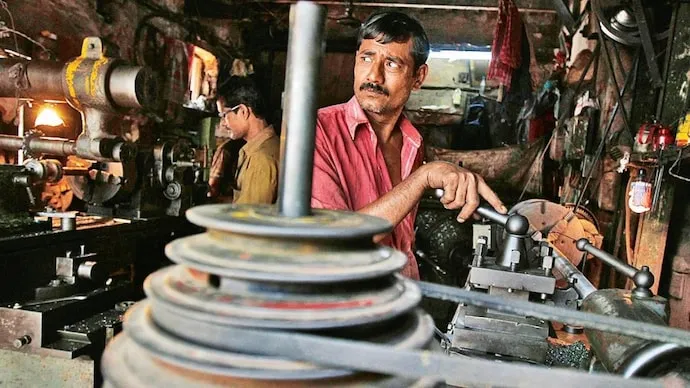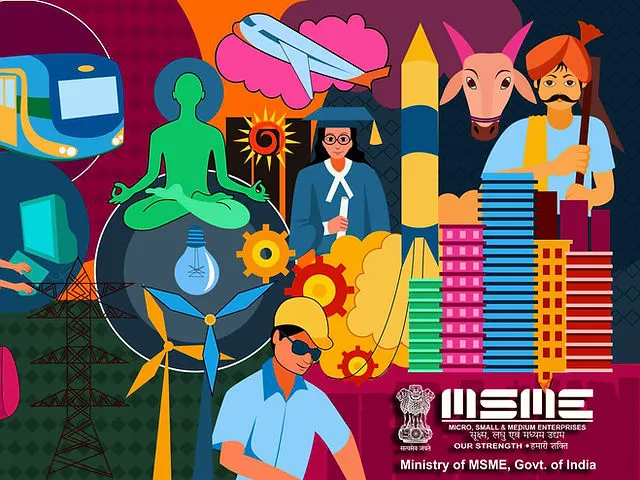Introduction
India’s economy relies heavily on the MSME sector, which encourages entrepreneurship and generates employment with minimal investment. It complements larger industries as ancillary units, contributing to inclusive industrial growth. However, the MSME sector faces challenges like limited access to finance, slow technology adoption, and struggles to compete globally.
What are MSMEs?
MSME stands for Micro, Small, and Medium Enterprises, which are businesses involved in producing, processing, and preserving goods and commodities.
They’re categorised based on their investment in machinery for manufacturing or equipment for services, along with their yearly turnover.
- In 2007, the Ministry of Small Scale Industries and the Ministry of Agro and Rural Industries combined to create the Ministry of Micro, Small, and Medium Enterprises.
- This ministry is responsible for crafting policies, organising programs, and overseeing their execution to assist MSMEs and foster their development.
- The Micro, Small, and Medium Enterprises Development Act of 2006 tackles multiple concerns impacting MSMEs, establishes a National Board for MSMEs, clarifies the notion of “enterprise,” and grants authority to the Central Government to bolster MSME competitiveness.

Significance in India’s Growth
GDP Contribution and Employment Generation
- MSMEs contribute around 30% to India’s GDP, significantly influencing economic growth.
- They are labour-intensive and contribute significantly to employment across different sectors, providing jobs to over 110 million individuals in India.
- For example, the textile industry, largely composed of small-scale units, employs a substantial workforce in tasks such as spinning, weaving, and apparel production.
Contribution to Manufacturing Output
- MSMEs make a substantial contribution to India’s manufacturing output, especially in industries such as food processing, engineering, and chemicals.
- For instance, the Agra footwear industry, primarily consisting of MSMEs, represents 28% of India’s footwear exports.
Export Promotion
- MSMEs presently account for roughly 45% of India’s overall exports, showcasing their substantial role in the country’s international trade.
- Their diverse product range, often targeting specific market segments, enhances India’s standing in global commerce.
- The Indian handicraft industry, primarily comprising small-scale artisans and businesses, holds a significant share in the global market and contributes substantially to India’s export earnings.
Innovation and Entrepreneurship
- The MSME sector encourages innovation and entrepreneurship, as smaller businesses can more readily adjust to market shifts and introduce novel offerings.
- For example, India’s startup environment, ranked third globally, is predominantly powered by MSMEs, leading to many inventive solutions in sectors like e-commerce and fintech.
Rural Industrialization
- MSMEs are crucial for driving rural industrialization and promoting inclusive development.
- The Khadi and Village industries sector, comprising small-scale enterprises, has played a key role in offering jobs in rural regions and uplifting local communities.

Key Indian Government Initiatives Related to MSMEs
- Pradhan Mantri MUDRA Yojana – It offers loans of up to 10 lakh to small and micro enterprises that are non-corporate and non-farm in nature. These loans are referred to as MUDRA loans.
- MSME SAMADHAAN – It is an online Delayed Payment Monitoring System overseen by the Micro and Small Enterprise Facilitation Council. It handles disputes related to delayed payments, allowing aggrieved MSMEs (Micro, Small, and Medium Enterprises) to file cases and track their status online.
- Credit Guarantee Schemes –The Credit Guarantee Fund Trust for Micro and Small Enterprises (CGTMSE) provides this scheme to alleviate the risk for banks and financial institutions, simplifying the process for MSMEs to obtain credit.
- Government e-Marketplace (GeM) is an online platform enabling public procurement from MSMEs, granting them broader market reach.
- Udyam Registration is a streamlined online registration system for MSMEs to access government benefits and schemes.
- The CHAMPIONS Portal – It is an ICT-driven Control Room and Management Information System geared toward enhancing productivity and national prowess through contemporary methods.
- Its objective is to empower Indian MSMEs to become National and Global CHAMPIONS by resolving their concerns and offering guidance, support, and aid throughout their journey.
Major Challenges Related to MSMEs
Lack of Adequate Access to Finance:
- MSMEs struggle to access sufficient financing despite government initiatives like Mudra loans.
- Traditional banks often view them as risky borrowers due to limited credit history and assets, hindering their ability to grow or innovate.
Delayed payments:
- Delayed payments are a major hurdle for MSMEs, particularly from larger firms or government bodies.
- These delays can severely impact their cash flow, making it difficult to sustain operations.
- Small suppliers or contractors may face financial strain if payments for their services are delayed, putting their businesses at risk.
Limited Skilled Workforce:
- MSMEs often face challenges in recruiting skilled workers proficient in operating sophisticated machinery or adopting new technologies.
- This can result in inefficiencies, delays in production, and diminished product quality.
Limited Branding and Outreach:
- MSMEs frequently encounter limitations in resources and know-how to efficiently promote their products and establish brand recognition.
- This poses challenges in competing with bigger corporations or well-known brands, particularly in the digital marketplace.
Infrastructure Constraints:
- MSMEs often face infrastructure limitations like bad roads, unstable power, and outdated facilities.
- For example, a rural food processing unit may struggle to deliver goods due to poor roads or encounter production disruptions because of unreliable power.
Way Forward
- Creating MSME innovation hubs, physical or virtual, to connect small businesses with experts, researchers, and mentors for knowledge sharing and product innovation.
- Implementing blockchain technology for secure and transparent transactions between MSMEs and clients, like larger companies or government agencies.
- Developing AI-powered mentorship programs tailored to the needs of MSMEs, especially those in remote areas, to bridge the mentorship gap.
- Embracing digital transformation through e-commerce, digital marketing, and automation to stay competitive in the digital age.
- Promoting sustainable practices among MSMEs, such as eco-friendly production methods and the use of renewable energy sources.


Leave a Reply
You must be logged in to post a comment.